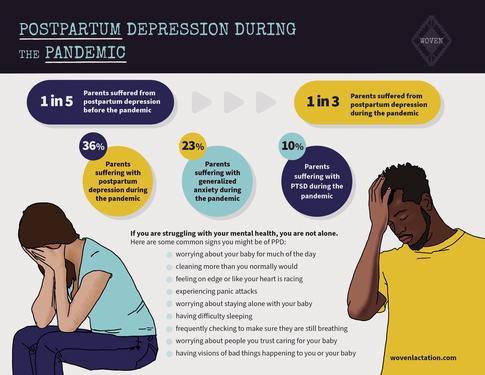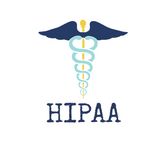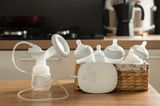If you have just had a new baby and you are struggling with your mental health, you are not alone. The one US study I could find on this issue reports that 36% of parents are experiencing postpartum depression, anxiety, or PTSD—more than 1 in 3, up from 1 in 5 before the pandemic.[1]
It wouldn't surprise me if the number were higher in some places, as this was a small study taking place in one part of the country. And in my conversations with colleagues, I've heard similar concerns over and over, with (informal) estimates as high as 1 in 2 parents.
We are all struggling during this lockdown, and I feel worried that new parents are getting lost in the mix. They feel almost forgotten right now, as for at least a short time after the birth they would be home not seeing too many people anyway—so it's easy to expect them to be hunkering down. But they are also out of sight and out of mind. And many are struggling. Their support systems are close to non-existent. That's why this article feels so important for me right now: new parents shouldn't be alone with this.
If you're reading this and know that you're struggling, you can skip straight to the second half of this article, where I list some strategies and resources for getting help. The first half of the article describes what we mean by postpartum depression and some reasons why some parents tend to struggle during that time period. This background can be useful for parents as well as postpartum support workers.
What we mean when we talk about postpartum depression
Any parent can experience postpartum depression (PPD).
This is such an important point. It is not restricted to the birthing parent. Dads, adoptive parents, and non-gestational parents, are all susceptible. Check in with your partner, and make sure to check on your non-birthing parent friends who are having babies as well. As with so many issues of mental health, we're in a period where we all need to help raise awareness where we can about PPD.
But what does PPD mean?
It's another instance of a catch-all term for what are really a range of postpartum mood disorders. The majority of the clients that I see with PPD present just as often with anxiety, and sometimes OCD, as they do with depression. Postpartum anxiety or OCD can be a little harder to spot, in part because we don’t talk about them as much, but also because we are so used to the idea that "new parents worry right???" Well, yes, new parents worry about their babies. But this usually doesn’t dictate how they live their lives—other than choosing a good car seat, a safe sleeping surface, and checking in with friends now and again to make sure they are on the right track, or the occasional call to the pediatrician. This isn’t what it looks like for parents with postpartum mood disorders.
Here are some common signs you might be struggling with PPD:
- you are worrying about your baby for much of the day
- you check frequently to make sure they are still breathing
- you have visions of bad things happening to you or your baby
- you are experiencing panic attacks
- you are having difficulty sleeping
- you are feeling on edge much of the time
- you feel like your heart is racing
- you’re worried about staying alone with your baby
- you are worried about other people who you trust caring for your baby
- you are cleaning more than you normally would, even though you don’t really have time or energy for it
Postpartum depression in the midst of a global pandemic
When I have talked to colleagues, there have been guesstimates that more than half of parents are now struggling with some form of postpartum mood disorder. I think this is probably more likely in my area than the 36% discovered in the study.
And there are good reasons for such a high prevalence. The postpartum time is a time of change. Of learning what it's like to parent this new life and of grieving what has been—your previous life without a baby, the time you spent sharing your body with your baby, your time with your partner without children.
It is also often a time of joy, the kind you may have never felt before. A lot is going on!
Now throw in a global pandemic, and the other deeply unsettling events of the past several years. I can’t imagine how anyone isn’t depressed really, and not everyone has the intense hormones running around their bodies a new parent is experiencing.
This is a lot! And you aren't alone. Many babies have been born this past year, and many parents are pregnant dealing with the uncertainty and anxiety of 2021. Most if not all of these parents are probably needing extra help.
Lactation, postpartum depression, and the pandemic
Still not convinced? Since my main experience is with lactation, let's talk about how lactation can relate to PPD. And how all this has gotten harder in the last year.
Breastfeeding, chestfeeding, and exclusive pumping can all be hard work, physically and emotionally. Especially if they are not going smoothly. They can also come with a lot of feelings of pressure or guilt. And these aspects all play a role in your mental health.
When it's going well, feeding can provide you with breaks throughout the day to remember to pause and have a quiet snuggle with your baby. Feeding also encourages parents to keep their babies physically close, which itself can be protective against postpartum depression.
Not all parents have this experience though. And this isn't talked about enough.
Many find it exhausting to be there for their baby so much of the time, and this exhaustion can put them at greater risk for PPD. Parents struggling with breastfeeding, chestfeeding, or exclusive pumping are also at increased risk—from the physical pain caused by breastfeeding or chestfeeding issues, the amount of work they are adding to achieve their lactation goals, or the grief or disappointment they may be facing from things not going to plan.
The gap in care that parents in the US healthcare system can face when beginning their journey breastfeeding or chestfeeding is what first brought me to lactation consultancy. Help and education at the right time can make such a big difference in outcomes. But an immediate consequence of the COVID-19 pandemic has been that getting the appropriate lactation support has become much more difficult. In many places support was already hard to find, and is now virtually nonexistent.
Many private practice lactation consultants have moved their practice online, but I know it's been slower for hospital or office-based lactation consultants. Peer support groups are not meeting in person, and only a small number have converted to an online format. Families are struggling more financially and are less likely to have the funds needed to pay to see a lactation consultant, or they may have lost jobs, and with them health insurance.
Stuck alone in your home, with another person who probably has never breastfed/chestfed their baby, how are you supposed to do this thing—that can be quite complicated—when you may not even know if you are doing it right???
This is an excruciatingly difficult situation. Try not to be hard on yourself if you don't feel like you're doing it right, it feels more difficult than you thought it would, you need to change your plans, or you need help.
But where do you turn for help? "I know everything is hard right now, what do I do about it??!!"

Right now help
I can only talk from the point of view of a lactation consultant and postpartum doula, but I wanted to share some of the ways I've seen clients approach this.
What's important to focus on is that, in the early stages of feeding (and of parenting), a little help early on is much more transformative than trying to find it when you're in pain, short on sleep, ... In our modern life, we're missing so much in terms of the web of care and experience that families, communities, and elders provided in the past. But whether you're just at the beginning or you're really struggling, don't underestimate how hard caring for a little human being can be. Grant yourself all the permission you need to take time for yourself or ask for help—you deserve it.
When you're on your own, and especially when it comes to mental health, it's important to focus on small achievable wins. Lots of them, lots of times a day. So here are some of the steps I walk clients through that can help, incrementally, to avoid burnout and increase positive outcomes.
Prioritize your mental health
Mental health is important! The way you feel is important! And it doesn’t just impact you; it also impacts your baby and the rest of your family.
That’s why mental health plays a big component in finding the right feeding plan for each family that I work with as a lactation consultant.
It’s important to remember that breastfeeding/chestfeeding, or exclusive pumping are not all or nothing.
Partially feeding your baby your own milk and partially feeding formula or donor milk works well for many families. Some parents also find balance from trading out direct feedings to pumping sessions, which may be faster and gives them a little alone time. The important thing to remember is, if you are feeling like the current situation is unmanageable for you, it's okay to make a change to support your mental health.
I know, self care sounds impossible right now. Really what you need is help, practical help, emotional support, lactation support. But I also know that just may not be in cards right now. Do the best you can keep up with the things that have traditionally kept you emotionally healthy. Here are some ideas:
- Get gentle exercise—after your body has recovered from the birth if you are the birthing parent.
- Make sure you are drinking enough water and eating a healthy balanced diet.
- Meditation or progressive relaxation can be helpful to support your nervous system relax for a little while. You likely won’t think of it when things are high stress, and that's okay. But if there is a time of day that works—first thing in the morning, when you get in bed at night, when you're feeding your baby—you will still receive the benefit. And you might find during the next high-stress incident you are able to stay calmer. There are some great easy to use apps like the Calm app (Kaiser members get this free) or the free insight timer app that can also help facilitate periods of relaxation.
- Limit media that doesn’t nourish you. Especially stressful news reports about the state of the world. It’s okay to take a few months off from being a good informed citizen. Making a news-free bubble can be very helpful to keeping your emotional state regulated.
- Find online spaces that fit you where other parents hang out, and that are moderated with rules in place to be supportive. I have a group for parents "Preparing for birth and breastfeeding or chestfeeding" currently on Facebook that you're welcome to join. Some groups are even organized by due date, so you are all going through the same thing together.
- Reach out to a friend that you trust to be a good listener and let them know how you are really doing.
Hire support
If you're dealing with pain or feeding issues, then obviously a lactation consultant is uniquely positioned to help you. Virtual consultations are very effective. And some lactation consultants are still doing in person appointments, especially if you're having more complicated issues.
Also, even if you're just generally worried about about feeding your baby, a lactation consultant can help. Part of what we do is educate parents on normal newborn behaviors, and help problem solve anything that's adding to your daily burden. Lots of clients don't realize this. For some families, having a lactation consultant just to put your mind at ease, is actually hugely impactful in how you experience your postpartum period. As a postpartum doula I'm also happy to to help educate parents on a broader range of new parenting subjects.
But if this doesn't describe your situation, you're not experiencing feeding related issues, or you can't access professional support at the minute, it is important to rely on whatever support network you have.
Get help from friends and family
Everyday support from friends and family is also so important in making the postpartum period manageable and giving you the space you need to focus on your new baby and what it means to parent them. Support is a lot harder to come by at the moment and that leaves parents feeling the deficit.
If you have friends or family who want to support you but don’t know how to because of the pandemic, link them to this list:
- Drop around dinner on the front step, or breakfast or lunch—just make sure it's nutritious and not too sugary. (Some of my clients end up with a table of cakes and cookies, which isn’t as helpful as a fridge full of nutritious meals.)
- Zoom babysit older kids: read books, do plays, shadow puppets, or what not to keep older kids busy for as long as you can. It’s not as good as taking them out for the day, but it's better than nothing.
- Hire a meal delivery service so nutritious meals turn up regularly.
- Offer to do grocery or baby gear runs (sometimes you don’t know you need something for your baby until you need it).
- Be a listening ear. This time is hard. Having someone you love who you can talk to, and doesn’t try to give advice, but just listens can be invaluable.
- Hire a postpartum doula if finances permit. Some wonderful postpartum doulas are strictly quarantining, so that they can become part of a family's bubble and can provide safe support during the days and nights.
- Pay for a virtual support group or parenting education classes that support the family's values.
Finding good medical support
There are resources out there to help, and many of them have very successfully converted online.
If medication is indicated, there are many options that are compatible with breastfeeding, chestfeeding, and exclusive pumping. If you are worried about medications while lactating, you can always check out Lactmed, which is a government run website that gives information on most medications and how they relate to lactation.
Please be gentle with yourself. Postpartum mood disorders are common and treatable. You will feel better with support.
If you are having thoughts of hurting yourself or your baby, please tell someone immediately, so you can get the help that you need.
If you are not sleeping at all, call an emergency support line or your doctor or other care provider's emergency support number, as days without sleep can very quickly escalate symptoms.
Emergency support services available 24 hours per day:
- Postpartum Support International offers a 24/7 Helpline available by calling 1-800-944-4773 or texting 1-503-894-9453.
- National Suicide Prevention Hotline 1-800-273-8255. Available 24 hours a day, to speak with a mental health professional right away.
https://www.sciencedirect.com/science/article/pii/S0165178120332133 ↩︎




